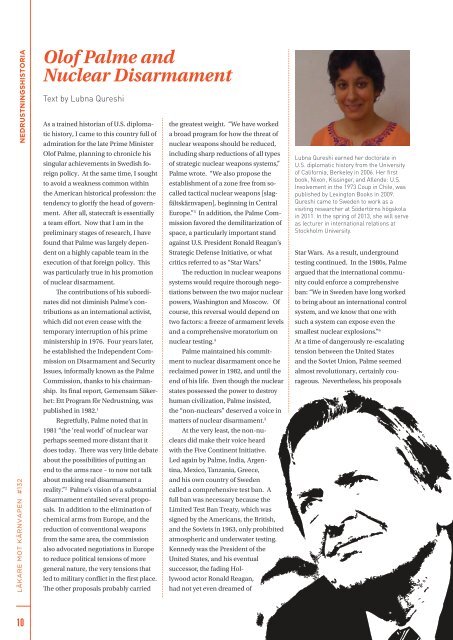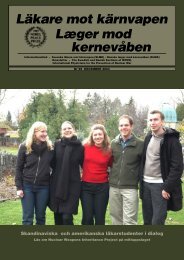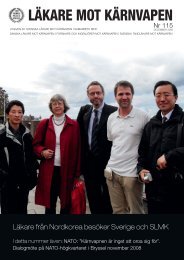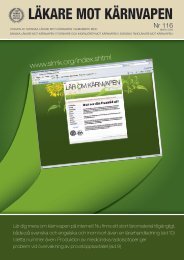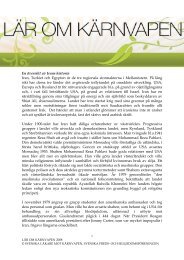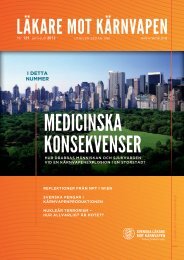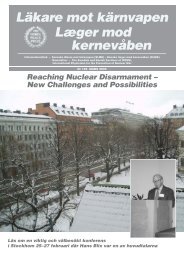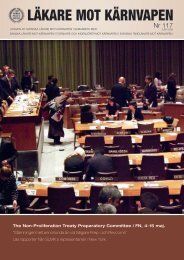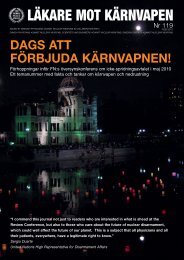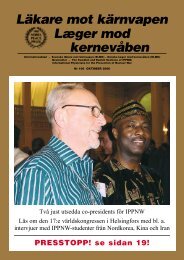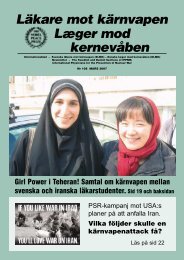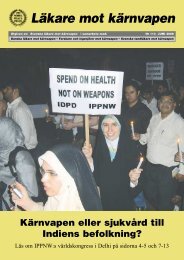i detta nummer - Svenska Läkare mot Kärnvapen
i detta nummer - Svenska Läkare mot Kärnvapen
i detta nummer - Svenska Läkare mot Kärnvapen
Create successful ePaper yourself
Turn your PDF publications into a flip-book with our unique Google optimized e-Paper software.
NEDRUSTNINGSHISTORIA<br />
LÄKARE MOT KÄRNVAPEN #132<br />
10<br />
Olof Palme and<br />
Nuclear Disarmament<br />
Text by Lubna Qureshi<br />
As a trained historian of U.S. diplomatic<br />
history, I came to this country full of<br />
admiration for the late Prime Minister<br />
Olof Palme, planning to chronicle his<br />
singular achievements in Swedish foreign<br />
policy. At the same time, I sought<br />
to avoid a weakness common within<br />
the American historical profession: the<br />
tendency to glorify the head of government.<br />
After all, statecraft is essentially<br />
a team effort. Now that I am in the<br />
preliminary stages of research, I have<br />
found that Palme was largely dependent<br />
on a highly capable team in the<br />
execution of that foreign policy. This<br />
was particularly true in his pro<strong>mot</strong>ion<br />
of nuclear disarmament.<br />
The contributions of his subordinates<br />
did not diminish Palme’s contributions<br />
as an international activist,<br />
which did not even cease with the<br />
temporary interruption of his prime<br />
ministership in 1976. Four years later,<br />
he established the Independent Commission<br />
on Disarmament and Security<br />
Issues, informally known as the Palme<br />
Commission, thanks to his chairmanship.<br />
Its final report, Gemensam Säkerhet:<br />
Ett Program för Nedrustning, was<br />
published in 1982. 1<br />
Regretfully, Palme noted that in<br />
1981 “the ‘real world’ of nuclear war<br />
perhaps seemed more distant that it<br />
does today. There was very little debate<br />
about the possibilities of putting an<br />
end to the arms race – to now not talk<br />
about making real disarmament a<br />
reality.” 2 Palme’s vision of a substantial<br />
disarmament entailed several proposals.<br />
In addition to the elimination of<br />
chemical arms from Europe, and the<br />
reduction of conventional weapons<br />
from the same area, the commission<br />
also advocated negotiations in Europe<br />
to reduce political tensions of more<br />
general nature, the very tensions that<br />
led to military conflict in the first place.<br />
The other proposals probably carried<br />
the greatest weight. “We have worked<br />
a broad program for how the threat of<br />
nuclear weapons should be reduced,<br />
including sharp reductions of all types<br />
of strategic nuclear weapons systems,”<br />
Palme wrote. “We also propose the<br />
establishment of a zone free from socalled<br />
tactical nuclear weapons [slagfältskärnvapen],<br />
beginning in Central<br />
Europe.” 3 In addition, the Palme Commission<br />
favored the demilitarization of<br />
space, a particularly important stand<br />
against U.S. President Ronald Reagan’s<br />
Strategic Defense Initiative, or what<br />
critics referred to as “Star Wars.”<br />
The reduction in nuclear weapons<br />
systems would require thorough negotiations<br />
between the two major nuclear<br />
powers, Washington and Moscow. Of<br />
course, this reversal would depend on<br />
two factors: a freeze of armament levels<br />
and a comprehensive moratorium on<br />
nuclear testing. 4<br />
Palme maintained his commitment<br />
to nuclear disarmament once he<br />
reclaimed power in 1982, and until the<br />
end of his life. Even though the nuclear<br />
states possessed the power to destroy<br />
human civilization, Palme insisted,<br />
the “non-nuclears” deserved a voice in<br />
matters of nuclear disarmament. 5<br />
At the very least, the non-nuclears<br />
did make their voice heard<br />
with the Five Continent Initiative.<br />
Led again by Palme, India, Argentina,<br />
Mexico, Tanzania, Greece,<br />
and his own country of Sweden<br />
called a comprehensive test ban. A<br />
full ban was necessary because the<br />
Limited Test Ban Treaty, which was<br />
signed by the Americans, the British,<br />
and the Soviets in 1963, only prohibited<br />
atmospheric and underwater testing.<br />
Kennedy was the President of the<br />
United States, and his eventual<br />
successor, the fading Hollywood<br />
actor Ronald Reagan,<br />
had not yet even dreamed of<br />
Lubna Qureshi earned her doctorate in<br />
U.S. diplomatic history from the University<br />
of California, Berkeley in 2006. Her first<br />
book, Nixon, Kissinger, and Allende: U.S.<br />
Involvement in the 1973 Coup in Chile, was<br />
published by Lexington Books in 2009.<br />
Qureshi came to Sweden to work as a<br />
visiting researcher at Södertörns högskola<br />
in 2011. In the spring of 2013, she will serve<br />
as lecturer in international relations at<br />
Stockholm University.<br />
Star Wars. As a result, underground<br />
testing continued. In the 1980s, Palme<br />
argued that the international community<br />
could enforce a comprehensive<br />
ban: “We in Sweden have long worked<br />
to bring about an international control<br />
system, and we know that one with<br />
such a system can expose even the<br />
smallest nuclear explosions.” 6<br />
At a time of dangerously re-escalating<br />
tension between the United States<br />
and the Soviet Union, Palme seemed<br />
almost revolutionary, certainly courageous.<br />
Nevertheless, his proposals


